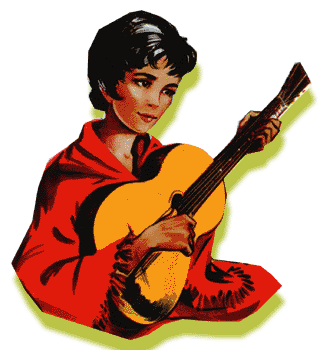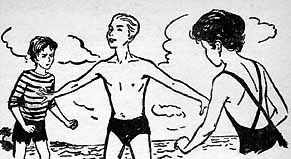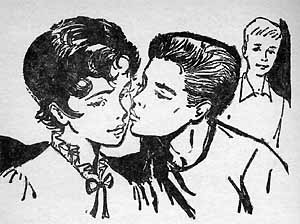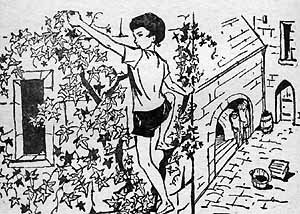|
Jo
the Gypsy

Jo, the
gypsy
Five
Fall Into Adventure
Note: the texts written in bold are my translation from
the French version used by Serge. You may find some differences between this
version and the original English one.
A
man and young boy were coming nearer. The boy, who looked like a gypsy, was
wearing a pair of rather dirty short trousers and a pull-over, and he was
barefoot.
That’s how Jo is introduced in the Famous Five series. And Jo is no
boy, but a girl.
Like George, she has short hair, she wears boys’ clothes and has a rather
fiery temper.
The children’s first reaction is suspicion. They don’t want the girl and
her father to approach them.
”They must smell bad”, Dick said to Julian.
George,
who has dug a hole in the sand, is deprived of it by the “gypsy boy”.
”Go away, I dug this hole. It’s mine!”
“He who leaves his place loses it”, the gypsy boy answered with a
melodious voice.
The
children jottle, Dick intervenes! A few violent blows follow… And soon, we
discover that the boy is in fact a girl. And the gypsy discovers that George
is a girl, too.
Both girls look so surprised that Julian can’t help laughing.
”It’s
forbidden to fight. And you, go!” Julian told the gypsy.

It’s
forbidden to fight
Thus
Jo enters the scene in the Famous Five world. A noticed entry.
That’s not the only time that Enid Blyton shows us tomboyish girls, who
have got character and enjoy clothing themselves like boys.
Henrietta/Henry in “The Five go to Mystery Moor” is one example. In
“Five on Finniston Farm”, the Philpot twins (Henry and Harry), a boy and
a girl, are both wearing boys’ clothes because Harry (Harriet) wants to
look like her brother.
Enid Blyton opposes to the very feminine (as it was understood at the time)
character of Anne a George and a Jo who both have a more tomboyish behaviour,
looks, clothes, walk (hands in their pockets)… authoritarian, even
aggressive, character…
Enid Blyton, forerunner authoress, announcing working women, sportswomen,
female adventurer! Who said the contrary?
When the Five go back to the beach, the little gypsy girl is back there too,
alone this time. George frowns…
The gypsy girl, at this moment, would certainly like to get closer to the
children… not staying alone, perhaps even making friends with them. But
how to approach those well-mannered children when oneself is a child born
and bred a Traveller, a little savage?
The little gypsy girl pelts them with cherry stones which she is skilled at
spitting.
Dick, the most “playful” of the Five, takes up the challenge, competes
with her and loses…
The
little gypsy girl was winning. She laughed, showing perfect, white teeth.
“I’ll pay your ice-cream, don’t worry!” Dick said.
From
then on, we can notice that Dick does feel a real attraction for Jo…
whereas George can’t stand her!
George:
This
horrid brat
This
horrible, not-combing-her-hair girl
Such
a girl
That
horrible gypsy
She’s
putting it on
Dick:
I
am sorry to have beaten you
Don’t
be mean, George
I
think she needs affection
Dick
had regrets…
Reciprocal
attraction, if we listen to Jo:
and
pointing to Dick: “He’s the only friendly one!”
So
much tenderness made the little gypsy cry again
”I
don’t like George, but I do like Dick!”
the
gypsy looked at him like a slave would look at a prince
”I’d
do everything for you! You’re nice.”

I'm sorry to have beaten you
Jo
has not had a good education. She often ignores what is good and what is
wrong.
She steals because she needs to, she lies without scruples. She likes
animals but gives Timmy a sleeping pill. She can’t read nor write, but she
is able to find her way through fields and forests without getting lost. She
knows how to juggle, and to walk on the tightrope. Her agility is surprising.
She is however very generous, and for those she likes, she’d do everything.
She might act wrongly, but if Dick disapproves, her heart melts and her
generosity gets over it.
The
little gypsy girl couldn’t resist to affection.
When
the children are lost in Ravens Forest, Anne shows Jo her sympathy by taking
her hands:
Jo
was surprised and touched, but she quickly withdrew her hand. She liked only
Dick. He was her hero, someone “not like the others”. He had been so
kind to her, and she was so glad to know him.
Jo,
the intrepid, goes with Dick and Julian to free George from a high tower
where she’s being held captive. Thus Jo, who doesn’t like George, is
going to take risks to save her… because of her friendship for Julian, and
her love for Dick.
She
does it with imagination, agility, and surprises everyone with her bravery:
she climbs the high tower with bare hands!
”She’ll
kill herself”, Dick said. “It’s horrible!” He shuddered.
“If she falls now, what will we do?”

If she
falls now, what will we do
But
everything goes well, and soon George is free, Timmy is safe. And Jo is
admired by all children.
”You
are a friend forever”, Julian said.
“And George’s friend?” the gypsy girl
asked.
”Of course”, she answered. “I’m sorry for all those silly things
I said. You’re as brave as a boy.”
The
adventure happily ends.
What
will Jo do?
”I
don’t want to go to an approved school”, the gypsy girl said,
panic-stricken.
”I won’t let that happen”, Dick declared. You’re one of the
nicest people I’ve ever known. We’ll find somebody who’ll take care of
you, somebody really nice like…”
”Like me”, said Joanna who had been listening.
Jo
is the most recurrent secondary character in the Famous Five series. We see
her again in “Five Have A Wonderful Time” and then in “Five Have
Plenty of Fun”.
Enid Blyton often calls on Travellers (gypsies) in her books. The Galliano
Circus series shows us young Carlotta [?], a circus rider, whom we also meet
in the “St Clare’s” series.
Those characters give the author the opportunity to get us closer to people
of a different background, who are often critized, and whose talents and
qualitites she underlines.
Jo will be, from now on, a honest and generous girl who will never forget
her former life, and who attaches little importance to comfort, luxury, and
principles… Still a little “savage”, excessive in her feelings,
disobedient and daredevilish…
Jo amuses the boys with her enthusiasm, her exuberance. George likes her,
but from a distance, and remains on the defensive. Jo is too much like
herself, but she can’t help admiring her.
Jo, and George, at the look of the messages that I receive, are characters
whom boys are particularly fond of. Young male readers have been in love
with George. Androgynous characters whom boys consider as comrades and
[girl] friends alike?
The
Five Have A Wonderful Time
The
Five are on holidays, in caravans, at Faynights Castle. Gypsies settle on
the same spot, and behave themselves with obvious hostility towards the
children. They have indeed some good reasons for that.
In this book (French edition, Hachette, “Bibliothèque Rose”, 1963), Jo
appears on page 95, just on time to help her friends.
She
arrived running, shouting and breathless. “Dick! Dick! Hey Dick!” as
he still is her favourite.
Jo,
by a fortunate coincidence, is the niece of Alfredo, the fire swallower, a
gypsy on the camp. At the time she arrives, the Five are in a bad position:
the Gypsies make fun of the boys, and Buffalo has just pulled out a few
hairs off Julian’s head with his whip…
Fiery and lively as ever, Jo shouts at Alfredo and the Gypsies, assembled
and confused. We notice that she has lost nothing of her flowery language.
George and Anne are surprised by Jo’s arrival. However, George is not
happy: she likes and admires Jo, but only from a distance. Her presence
makes George all jittery. So she says with irony:
”She is certainly busy singing Dick’s praises.”
But also at shouting at the Gypsies. And the girl confesses:
”I
prefer not to repeat what I told them, it was rude.”
Jo
goes to school now, and lives in a house. But she still enjoys sleeping on
the ground, under the caravan. She looks awkward in her clothes, and she
asks George to lend her a pair of shorts. George refuses…
Nevertheless,
Jo is soon feeling at her ease. The caravans, the campfires, the strange
animals are all familiar to the little girl. And the Gypsy music makes her
dream…
A
very sweet song, accompanied on the guitar, rose in the night.
Jo,
little by little, is soon her former self, the little gypsy girl.
Jo
felt so much at ease among those fairground people that the children were
wondering whether she would ever go back to her adoptive parents.
An
attaching character, Jo loves her freedom, and refuses any constraints. She
loves walking barefoot, singing and dancing in front of the fire. It’s the
rebellious, free, primary side of childhood that Enid Byton makes us feel,
and we are not insensitive to it.

Five
Have Plenty Of Fun
Little
or no surprise to see Jo back in this book. Berta, the little girl
threatened with kidnapping, has to leave George’s home for her own
security. Joanna, whose cousin has taken on Jo, proposes to let Berta go
there.
Jo, the gypsy, and Berta, the well-mannered, shy girl, could not easily live
under the same roof, not without any clashes…
Jo arrives, through the window as is her habit, and tells the boys:
”When I came back home, I found this girl called Jane (Berta’s name
while hiding). She told me that George had been kidnapped instead of
herself. So I asked her “Are you not ashamed? Go back from where you came
and shout that you are the one supposed to get kidnapped”.
And Jo finishes:
”She went to a corner, crying. What a coward!”
The
boys try to explain to her Berta’s behaviour but Jo, who had been brought
up the hard way, doesn’t want to listen. Her unhappy childhood has let no
place for sentimentality.
Jo wants to leave immediately to help George, but the boys ask her to be
patient. Julian refuses to lend her his bike.
Not at all bothered, Jo takes Dick’s who is left cursing and striking his
pillow with his fist…
Later, the boys ask her to stay at Kirrin Cottage, with Anne.
To no avail! Jo, without scruples, takes Anne’s bike and comes the the
Five’s rescue when they are in a bad situation.
One
can easily forgive Jo her lies and deceptions. They are made in all
innocence, without nastiness. And she is so touching in her clumsiness, that
one can not hold anything against her.
Thus Enid Blyton has portrayed an attractive character, whom many young
readers have discovered with joy, remembering a taste of freedom, carefree
life, and disobedience…
Article
written by Serge.
Translation:
Anne.
Illustration musicale : Jürg
Hochweber. Libre pour une utilisation non commerciale
http://www.hochweber.ch/guitar.htm |





